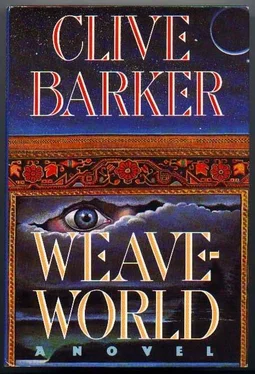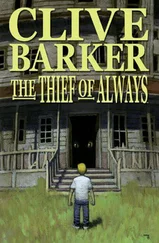Clive Barker - Weave World
Здесь есть возможность читать онлайн «Clive Barker - Weave World» весь текст электронной книги совершенно бесплатно (целиком полную версию без сокращений). В некоторых случаях можно слушать аудио, скачать через торрент в формате fb2 и присутствует краткое содержание. Жанр: Фантастика и фэнтези, на английском языке. Описание произведения, (предисловие) а так же отзывы посетителей доступны на портале библиотеки ЛибКат.
- Название:Weave World
- Автор:
- Жанр:
- Год:неизвестен
- ISBN:нет данных
- Рейтинг книги:4 / 5. Голосов: 1
-
Избранное:Добавить в избранное
- Отзывы:
-
Ваша оценка:
- 80
- 1
- 2
- 3
- 4
- 5
Weave World: краткое содержание, описание и аннотация
Предлагаем к чтению аннотацию, описание, краткое содержание или предисловие (зависит от того, что написал сам автор книги «Weave World»). Если вы не нашли необходимую информацию о книге — напишите в комментариях, мы постараемся отыскать её.
Weave World — читать онлайн бесплатно полную книгу (весь текст) целиком
Ниже представлен текст книги, разбитый по страницам. Система сохранения места последней прочитанной страницы, позволяет с удобством читать онлайн бесплатно книгу «Weave World», без необходимости каждый раз заново искать на чём Вы остановились. Поставьте закладку, и сможете в любой момент перейти на страницу, на которой закончили чтение.
Интервал:
Закладка:
She saw Mimi now, sitting in an armchair near to a fire that barely warmed the soot in the grate. Her fare - soared and sad to the brink of tragedy - was pale with powder, the brows meticulously plucked, the eyes glittering even in the dour tight through the lace curtains.
She spoke; and her soft syllables drowned out the din of the motorway.
‘Suzanna...'
Addressed from the past, she listened.
‘... I've something for you.'
The child's heart had fallen from its place, and thumped around in her belly.
‘Say thank you, Suzie,' her mother chided.
The child did as she was told.
‘It's upstairs; Mimi said, ‘in my bedroom. You can go and get it for yourself, can't you? It's all wrapped up, at the bottom of the tall-boy.'
‘Go on, Suzie.'
She felt her mother's hand on her arm, pushing her away towards the door.
‘Hurry up now.'
She glanced at her mother, then back at Mimi. There was no mercy to be had from either. They would have her up those stairs, and no protest would mellow them. She left the room and went to the bottom of the stairs. They were a mountain-face before her; and the darkness at the summit a terror she tried not to contemplate. In any other house she would not have been so fearful. But this was Mimi's house; Mimi's darkness.
She climbed, her hand clinging to the bannister, certain that something terrible awaited her on every stair. But she reached the top without being devoured, and crossed the landing to her grandmother's bedroom. The drapes were barely parted; what little light fell between was the colour of old stone. A clock ticked on the mantelpiece, at a quarter the speed of her pulse. On the wall above the clock, gazing down the length of the head-high bed was an oval portrait photograph of a man in a suit that was buttoned up to the neck. And to the left of the mantelpiece, across a carpet that killed her footsteps, was the tall-boy, twice her size and more.
She went to it quickly, determined - now that she was in the room - to do the deed and be out before the ticking had its way with her and slowed her heart ‘til it stopped.
Reaching up, she turned the chilly handle. The door opened a little. From inside bloomed the smell of moth-balls, shoe leather and lavender water. Ignoring the gowns that hung in the shadows she plunged her hand amongst the boxes and tissue paper at the bottom of the tall-boy, hoping to chance upon the present.
In her haste, she pushed the door, wide - and something wild-eyed lurched out of the darkness towards her. She screamed. It mocked her, screaming back in her face. Then she was running towards the door, tripping on the carpet in her flight, before hurtling downstairs.
Her mother was in the hallway ‘What is it, Suzie?'
There were no words to tell. Instead she threw herself into her mother's arms - though, as ever, there was that moment when they seemed to hesitate before chasing to hold her - and sobbed that she wanted to go home. Nor, would she be placated, even after Mimi had gone upstairs and returned saying something about the mirror in the tall-boy door.
They'd left the house soon after that, and, as far as she could now recall, Suzanna had never since entered Mimi's bedroom. As for the gift, it had not been mentioned again.
That was the bare bones of the memory, but there was much else - perfumes; sounds; nuances of light - that fleshed those bones. The incident, once exhumed, had more authority than events both more recent and ostensibly more significant. She could not now conjure - nor would ever, she suspected - the face of the boy to whom she'd given her virginity, But she would remember the smell from Mimi's tall-boy as though It were still in her lungs.
Memory was so strange.
And stranger still, the letter, at the beck of which she was making this journey.
It was the first missive she'd received from her grandmother for over a decade. That fact alone would have been sufficient to have her foresake the studio and come. But the message itself, spindly scrawlings on an air-mail paper page, had lent her further speed. She'd left London as soon as the summons had arrived, as if she'd known and loved the woman who'd written it for half a hundred years:
Suzanna. it had begun. Not Dear nor Dearest. Simply:
Suzanna, Forgive my scribbles. I'm sick at the moment. I feel weak some hours, and not so weak others. Who knows how I'll feel tomorrow? That's why I'm writing to you now, Suzanna, because I'm afraid of what may happen.
Will you come to see me, at the house? We have very much to say to each other, I think. Things I didn't want to say, but now I have to.
None of this will make much sense to you, I know, that I can't be plain, not in a letter. There are good reasons.
Please come. Things are different to the way I thought they'd be. We can talk, the way we should have talked many years ago.
My love to you, Suzanna, Mimi.
The letter was like a midsummer lake. Its surface placid, but beneath?; such darkness. Things are different to the way I thought they'd be, Mimi had written. What did she mean? That life was over too soon, and her sunlit youth had contained no clue as to how bitter mortality would be? The letter had been delayed, through the vagaries of the postal service, by over a week. When, upon getting it, she'd rung Mimi's house she'd received only the number disconnected tone. Leaving the pots she was making unfinished, she had packed a bag and driven North.
2
She went straight to Rue Street, but number eighteen was empty. Sixteen was also deserted, but at the next house a grid woman by the name of Violet Pumphrey was able to offer some explanation. Mimi had fallen sick a few days earlier, and was now in Sefton General Hospital, close to death. Her creditors, which included the Gas and Electricity Boards, and the Council, in addition to a dozen suppliers of food and drink, had immediately made moves to claim some recompense.
‘Like vultures, they were,' said Mrs Pumphrey, ‘and her not even dead yet. It's shameful. There they were, taking everything they could lay their hands on. Mind you, she was difficult. Hope you don't mind my being plain, love? But she was. Kept herself hidden away in the house most of the time. It was a bloody fortress. That's why they waited, see? ‘til she was peggin' out. If they'd tried to get in with her there they'd have still been tryin'.'
Had they taken the tall-boy? Suzanna idly wondered. Thanking Mrs Pumphrey for her help, she went back to have another look at number eighteen - its roof so covered in bird-shit it looked to have had its own private blizzard - then went on to the hospital.
3
The nurse wore her show of compassion indifferently well. ‘I'm afraid Mrs Laschenski's very sick. Are you a close relative?'
‘I'm her grand-daughter. Has anybody else been to see her?'
‘Not that I know of. There really isn't that much point. She's had a major stroke, Miss-.'
‘Parrish. Suzanna Parrish.'
‘Your grandmother's unconscious most of the time, I'm afraid.'
‘I see.'
‘So please don't expect too much.'
The nurse led her down a short corridor to a room that was so quiet Suzanna could have heard a petal drop, but that there were no flowers. She wasn't unfamiliar with death rooms; ha mother and father had died three years before, within six months of each other. She recognised the scent, and the hush, as soon as she stepped inside.
‘She's not been awake today,' said the nurse, as she stood back to let Mind's visitor approach the bed.
Suzanna's first thought was that there'd been some colossal error. This couldn't be Mimi. This poor woman was too frail: too white. The objection was on the tip of her tongue when she realized that the error was hers. Though the hair of the woman in the bed was so thin that her scalp gleamed through, and the skin of her fare was draped slackly on her skull like wet muslin, this was, nevertheless, Mini. Robbed of power; reduced by some malfunction of nerve and muscle to this unwelcome passivity; but still Mimi.
Читать дальшеИнтервал:
Закладка:
Похожие книги на «Weave World»
Представляем Вашему вниманию похожие книги на «Weave World» списком для выбора. Мы отобрали схожую по названию и смыслу литературу в надежде предоставить читателям больше вариантов отыскать новые, интересные, ещё непрочитанные произведения.
Обсуждение, отзывы о книге «Weave World» и просто собственные мнения читателей. Оставьте ваши комментарии, напишите, что Вы думаете о произведении, его смысле или главных героях. Укажите что конкретно понравилось, а что нет, и почему Вы так считаете.











